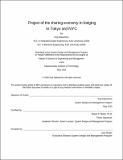Project of the sharing economy in lodging in Tokyo and NYC
Author(s)
Nakashima, Koji, S.M. Massachusetts Institute of Technology.
Download1263245074-MIT.pdf (3.028Mb)
Other Contributors
Massachusetts Institute of Technology. Engineering and Management Program.
System Design and Management Program.
Advisor
Bryan R. Moser.
Terms of use
Metadata
Show full item recordAbstract
The sharing economy in lodging such as Airbnb gives travelers many different kinds of accommodations in many different locations at cheap prices. However, many local governments are struggling with how to incorporate such businesses in their society. In Japan, although the business has the merit of absorbing the rapid growth of travelers from abroad, many local governments hesitate to accelerate these businesses because they are concerned about safety and security. Also, New York City is very negative about these businesses. The City thinks that the sharing economy in the lodging business is responsible for the increasing housing fees and the decrease in rental property vacancies in NYC. The aim of this study is to create systems that are safe and socially acceptable for Tokyo and NYC. In order to create the systems for Tokyo and NYC, we carry out three analyses. In the first analysis, we clarify for whom the architectures are made and what parties are related to the business. Hosts, guests, neighbors, local governments, investors and the home-sharing company are involved in the home-sharing ecosystems. Then a system model which shows the activities of the home-sharing business is created in order to get the insights of the platform for the potential architectures. Also the system model is used for investigating the safety risks in the home-sharing dynamics. The system model shows the stakeholders' activities such as the home-sharing transactions, hosts' services and the regulation of the local government. Next, we find the risks in the home-sharing ecosystems. We investigate more detailed interactions between the home-sharing company, neighbors, hosts and guests in the system model. Then we find all the possible risks in the interactions. This analysis is carried out for three different room types (Entire House, Private Room, Shared Room) because different kinds of risks are found in different room types. From the analysis, we find 10 important factors which consist of the performance of the architectures. (room types, ID check systems, entrance locks, key delivery methods, room locks, fire alarms and detectors, fire prevention facilities, security systems and detection methods for privacy invention such as hidden cameras) The potential architectures are created by combining the options in the 10 factors. We create more than fifteen thousand different architectures for Tokyo and NYC, separately. Then we evaluate these architectures based on safety, social acceptability, and convenience. The cultural and social factors are also investigated because they can lead to differences in the preferred architectures. The preferred architecture in Tokyo is found to be Entire House with the entrance lock of either a PIN code or a regular key, while it is Private Room with the entrance secured by a regular key in NYC. To extend the study, safe and socially acceptable architectures in other cities can be investigated by following the steps in this thesis. Introducing a house type accommodation would be another extension because only the apartment type is considered in this thesis to reduce the complication of calculation. Then there would be additional features that need to be considered for the house type accommodation, such as gardens. The cost in view of multiple stakeholders can also stretch the study. This includes hosts' OPEX, accommodation prices and costs of the sharing economy companies.
Description
Thesis: S.M. in Engineering and Management, Massachusetts Institute of Technology, System Design and Management Program, May, 2020 Cataloged from the official version of thesis. Includes bibliographical references (pages 104-109).
Date issued
2020Department
Massachusetts Institute of Technology. Engineering and Management ProgramPublisher
Massachusetts Institute of Technology
Keywords
Engineering and Management Program., System Design and Management Program.